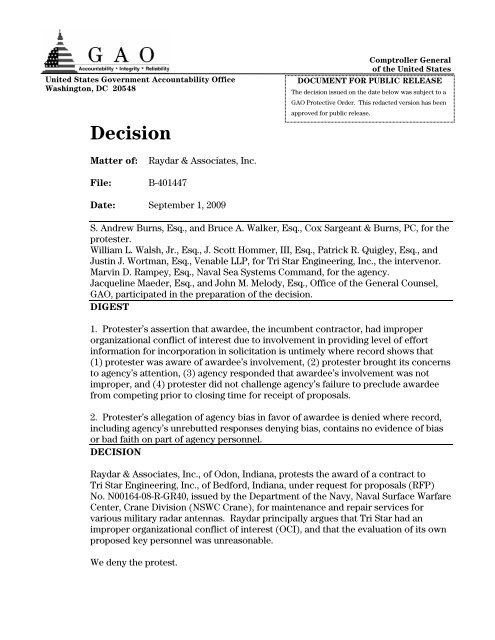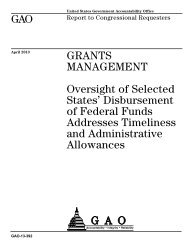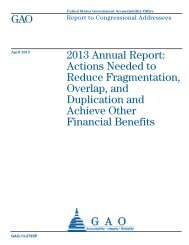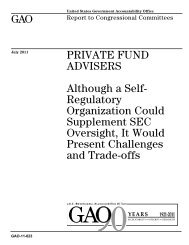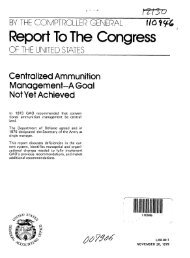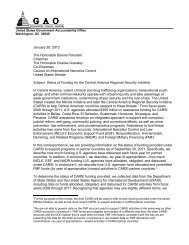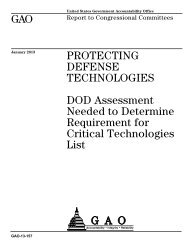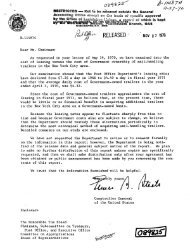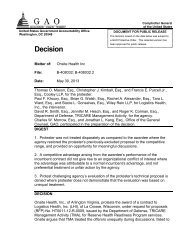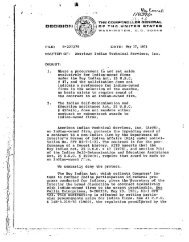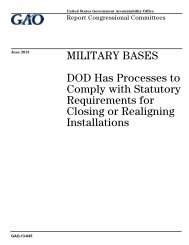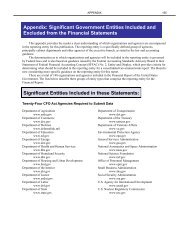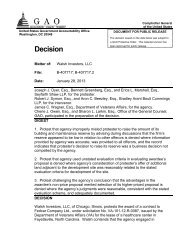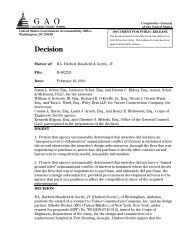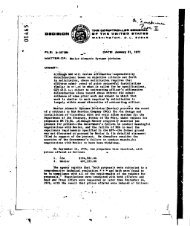Decision - US Government Accountability Office
Decision - US Government Accountability Office
Decision - US Government Accountability Office
Create successful ePaper yourself
Turn your PDF publications into a flip-book with our unique Google optimized e-Paper software.
United States <strong>Government</strong> <strong>Accountability</strong> <strong>Office</strong><br />
Washington, DC 20548<br />
<strong>Decision</strong><br />
Matter of: Raydar & Associates, Inc.<br />
File: B-401447<br />
Date: September 1, 2009<br />
Comptroller General<br />
of the United States<br />
DOCUMENT FOR PUBLIC RELEASE<br />
The decision issued on the date below was subject to a<br />
GAO Protective Order. This redacted version has been<br />
approved for public release.<br />
S. Andrew Burns, Esq., and Bruce A. Walker, Esq., Cox Sargeant & Burns, PC, for the<br />
protester.<br />
William L. Walsh, Jr., Esq., J. Scott Hommer, III, Esq., Patrick R. Quigley, Esq., and<br />
Justin J. Wortman, Esq., Venable LLP, for Tri Star Engineering, Inc., the intervenor.<br />
Marvin D. Rampey, Esq., Naval Sea Systems Command, for the agency.<br />
Jacqueline Maeder, Esq., and John M. Melody, Esq., <strong>Office</strong> of the General Counsel,<br />
GAO, participated in the preparation of the decision.<br />
DIGEST<br />
1. Protester’s assertion that awardee, the incumbent contractor, had improper<br />
organizational conflict of interest due to involvement in providing level of effort<br />
information for incorporation in solicitation is untimely where record shows that<br />
(1) protester was aware of awardee’s involvement, (2) protester brought its concerns<br />
to agency’s attention, (3) agency responded that awardee’s involvement was not<br />
improper, and (4) protester did not challenge agency’s failure to preclude awardee<br />
from competing prior to closing time for receipt of proposals.<br />
2. Protester’s allegation of agency bias in favor of awardee is denied where record,<br />
including agency’s unrebutted responses denying bias, contains no evidence of bias<br />
or bad faith on part of agency personnel.<br />
DECISION<br />
Raydar & Associates, Inc., of Odon, Indiana, protests the award of a contract to<br />
Tri Star Engineering, Inc., of Bedford, Indiana, under request for proposals (RFP)<br />
No. N00164-08-R-GR40, issued by the Department of the Navy, Naval Surface Warfare<br />
Center, Crane Division (NSWC Crane), for maintenance and repair services for<br />
various military radar antennas. Raydar principally argues that Tri Star had an<br />
improper organizational conflict of interest (OCI), and that the evaluation of its own<br />
proposed key personnel was unreasonable.<br />
We deny the protest.
The solicitation, issued on October 16, 2008, contemplated the award of a 5-year<br />
indefinite-delivery/indefinite-quantity contract, under which the agency intends to<br />
issue cost-plus-fixed-fee and fixed-price delivery orders. RFP at 2-9, 32, and 71.<br />
Award was to be made to the firm whose offer was evaluated as the “best value” to<br />
the government, considering: 1) technical capability (with subfactors for personnel<br />
qualifications/resumés, facility plan, and subcontracting/teaming arrangement),<br />
2) past performance, 3) management plan and corporate capability (with sub-factor<br />
for management plan and corporate capability), and 4) price. RFP at 69-70.<br />
The agency received proposals from Tri Star, the incumbent contractor, and from<br />
Raydar, Tri Star’s current subcontractor. Raydar’s proposal was rated marginal,<br />
high-risk overall, with a rating of marginal under the personnel qualifications/<br />
résumés subfactor. Tri Star’s proposal was rated excellent, low-risk overall, with a<br />
rating of excellent under the personnel qualifications/résumés subfactor. Agency<br />
Report (AR), attach. D, Consensus Rating Summary Table and Source Selection<br />
Report, at 1. Award was made to Tri Star on May 8, and Raydar was notified of the<br />
award on May 11. AR, attach. E, Notice of Award, at 1-2. The agency provided<br />
Raydar a detailed written debriefing, including specific strengths and deficiencies<br />
identified for each of Raydar’s proposed key personnel. AR, attach. G, Raydar<br />
Debriefing, at 3-4.<br />
OCI<br />
Raydar alleges that Tri Star had an improper OCI, and that the award therefore was<br />
improper, because a Tri Star employee assisted in drafting portions of the RFP.<br />
Raydar contends that the awardee “was directly involved in the collection of data to<br />
compile contract/solicitation estimates,” Protest at 1-2, and that this involvement<br />
provided Tri Star with an inequitable “home court advantage.” Protester Comments<br />
at 2. In this regard, the Federal Acquisition Regulation (FAR) generally requires<br />
contracting officials to avoid, neutralize, or mitigate potential significant conflicts of<br />
interest so as to prevent an unfair competitive advantage or the existence of<br />
conflicting roles that might impair a contractor’s objectivity. FAR §§ 9.501, 9.504,<br />
9.505.<br />
The agency acknowledges that a Tri Star employee provided information regarding<br />
Tri Star’s level of effort in performing the previous contract. AR at 1, 8. The agency<br />
reports, however, that the employee executed a non-disclosure agreement and did<br />
not have access to proprietary or competition-sensitive information, and that the<br />
information provided by the employee was incorporated into the solicitation. AR<br />
at 1; RFP at 3, 66. 1<br />
1<br />
Similarly, a Raydar employee completed the contract data requirements list,<br />
identifying the deliverables, such as progress, status and management reports, that<br />
the contractor is to provide under the contract. AR at 1. This list was also included<br />
(continued...)<br />
Page 2 B-401447
Under our Bid Protest Regulations, protests based upon alleged improprieties in a<br />
solicitation that are apparent prior to the time set for receipt of initial proposals<br />
must be filed prior to that time 4 C.F.R. § 21.2(a)(1) (2009). The record shows that<br />
the protester was aware of Tri Star’s employee’s involvement with the preparation of<br />
the solicitation as early as February 26, 2008. In this regard, in an e-mail exchange<br />
with the agency on that date, Raydar stated that it is “a bit uncomfortable” with<br />
Tri Star’s involvement “in the casting of the new contract offerings,” Protester<br />
Comments, exh. 1, E-Mail between Raydar and NSWC Crane, at 2, and the agency<br />
responded the same day that Tri Star’s employee was only “data collecting” to help<br />
the agency compile contract estimates and would not have any role in source<br />
selection or have any influence on contract award. Id. at 1. There is no evidence of<br />
any further objection by Raydar.<br />
As a general rule, a protester is not required to protest that another firm has an<br />
impermissible OCI until after that firm has been selected for award. REEP, Inc.,<br />
B-290688, Sept. 20, 2002, 2002 CPD 158 at 1-2. A different rule applies, however,<br />
where a solicitation is issued on an unrestricted basis, the protester is aware of the<br />
facts giving rise to the potential OCI, and the protester has been advised by the<br />
agency that it considers the potential offeror eligible for award. Honeywell Tech.<br />
Solutions, Inc., B-400771, B-400771.2, Jan. 27, 2009, 2009 CPD 49 at 6-7; Abt<br />
Assocs., Inc., B-294130, Aug. 11, 2004, 2004 CPD 174 at 2. In such cases, the<br />
protester cannot wait until an award has been made to file its protest of an<br />
impermissible OCI, but instead must protest before the closing time for receipt of<br />
proposals. Honeywell Tech. Solutions, Inc., supra.<br />
Here, Raydar’s concerns that a specific Tri Star employee was involved in the<br />
preparation of the solicitation arose prior to the RFP’s closing date. Further, it is<br />
clear that Raydar was aware that Tri Star was likely to compete, and that the agency<br />
did not consider Tri Star to have an OCI that precluded it from receiving the award.<br />
Under these circumstances, Raydar’s protest is untimely because it was not filed<br />
prior to the closing time for receipt of proposals. Honeywell Tech. Solutions, Inc.,<br />
supra, at 7.<br />
In any event, the record does not support Raydar’s claim that Tri Star had an OCI or<br />
that Tri Star gained a competitive advantage. While Raydar claims that Tri Star “was<br />
in a position to influence or otherwise tailor” the RFP to meet its particular<br />
strengths, Protester Comments at 2, it does not allege any specific facts showing that<br />
an OCI exists. The record shows that Tri Star did not participate in the preparation<br />
(...continued)<br />
in the solicitation at pages 102-05. Id. Raydar’s employee also executed a<br />
non-disclosure agreement, and was not given access to proprietary or<br />
competition-sensitive information. Id.<br />
Page 3 B-401447
of the specifications or the statement of work, and that the Tri Star employee’s<br />
efforts were limited to collecting data regarding Tri Star’s own level of effort under<br />
Tri Star’s current contract. Raydar does not explain how Tri Star’s involvement in<br />
this manner could have created a competitive advantage, and no actual or potential<br />
advantage is otherwise apparent to us. Further, all of the level of effort information<br />
was provided to Raydar and other potential offerors in the solicitation. We conclude<br />
that there is no basis to find that Tri Star had an OCI or an unfair advantage in the<br />
procurement.<br />
KEY PERSONNEL EVALUATION<br />
Raydar challenges the agency’s evaluation of its proposed key personnel. Noting<br />
that the agency stated during its debriefing that its key personnel were found to be<br />
“unqualified to perform tasking,” Raydar asserted in its protest that “All proposed<br />
key personnel offered by the Protester are either currently performing the tasking<br />
specified within the solicitation or have performed effectively in the proposed<br />
capacity within the past three (3) years . . . .” Protest at 2. The agency responded in<br />
its report by explaining the basis for downgrading each employee. AR at 16-17. In its<br />
subsequent comments on the report, Raydar for the first time provided specific<br />
assertions as to how the agency’s evaluation was improper regarding specific<br />
employees. Protester Comments at 3-7.<br />
As noted above, protests based on other than solicitation improprieties must be filed<br />
within 10 calendar days after the protester knew or should have known it bases of<br />
protest. 4 C.F.R. § 21.2(a)(2). Further, where a protester initially files a timely<br />
protest, and later supplements it with independent grounds of protest, the<br />
later-raised allegations must independently satisfy the timeliness requirements, since<br />
our Regulations do not contemplate the unwarranted piecemeal presentation or<br />
development of protest issues. FR Countermeasures, Inc., B-295375, Feb. 10, 2005,<br />
2005 CPD 52 at 9. In this regard, where a protester raises a general argument in its<br />
initial submission, but fails to provide details within its knowledge until later, so that<br />
a further response from the agency would be needed in order for us to adequately<br />
review the matter, these later, more specific arguments and issues will not be<br />
considered unless they independently satisfy the timeliness requirements under our<br />
Regulations. Planning and Dev. Collaborative Int’l, B-299041, Jan. 24, 2007, 2007 CPD<br />
28 at 11. We have found supplemental protest grounds untimely where they<br />
consist of “examples” of flaws in an agency’s evaluation generally alleged in the<br />
initial protest; such a staggered presentation of issues, each of which involves<br />
different factual circumstances and requires a separate explanation from the agency,<br />
constitutes precisely the type of piecemeal presentation of issues that our timeliness<br />
rules do not permit. Id.<br />
The record shows that Raydar was advised of the personnel weaknesses identified<br />
by the agency as early as the agency’s written debriefing. AR, attach. G, Raydar<br />
Debriefing, at 3-4. Nonetheless, the detailed comments purporting to support<br />
Page 4 B-401447
Raydar’s earlier broad allegation were not filed until July 15, that is, 6 weeks after the<br />
protest was filed. Since Raydar did not raise its challenge to the evaluation of its<br />
proposed key personnel with the requisite degree of specificity until it filed its<br />
comments, weeks after learning the basis for the challenge, it is untimely and will<br />
not be considered. 4 C.F.R. § 21.2(a)(2); Eisenhower Real Estate Holdings, LLC,<br />
B-310941, Mar. 18, 2008, 2008 CPD 69 at 5-6.<br />
Throughout the development of the protest, and in its comments on the agency<br />
report, Raydar has characterized its original protest as also asserting that it and<br />
Tri Star proposed some of the same personnel, and that these personnel were<br />
evaluated differently under the two proposals. Protester Request for Additional<br />
Documents, at 1-2; Protester Comments at 2-3. We do not agree that this argument<br />
was raised in Raydar’s initial protest. Beyond the language cited above regarding the<br />
personnel evaluation, Raydar’s protest stated only that its “personnel assets are so<br />
valued that the Competitor has been actively recruiting the Protester’s key personnel<br />
before, during, and after the open bid period.” Protest at 2. The protest makes no<br />
reference whatsoever to the possibility that identical personnel proposed by both<br />
contractors were evaluated differently. See Theisinger und Probst<br />
Bauunternehmung GmbH, B-275756, Mar. 25, 1997, 97-1 CPD 168 at 8 n.4.<br />
BIAS<br />
Raydar asserts that the agency exhibited bias in favor of Tri Star. Specifically, the<br />
protester complains that the agency provided Tri Star access to government space,<br />
enabling Tri Star to gather space and equipment requirements data, offered Tri Star<br />
an opportunity to lease agency space, and delayed the award to provide Tri Star an<br />
opportunity “to amend some portion” of its proposal. Protest at 2.<br />
Prejudicial motives will not be attributed to contracting officials on the basis of<br />
unsupported allegations, inference, or supposition. Leader Communications Inc.,<br />
B-298734, B-298734.2, Dec. 7, 2006, 2006 CPD 192 at 9; McDonnell-Douglas Corp.,<br />
B-259694.2, B-259694.3, June 16, 1995, 95-2 CPD 51 at 28. Raydar has not<br />
sufficiently supported its allegations.<br />
Regarding access to government space, while the agency confirms that Tri Star did<br />
have access to space, it explains that this was by virtue of its status as the incumbent<br />
contractor, and was not provided for purposes of this procurement. The agency<br />
further explains that, as the incumbent subcontractor, Raydar had similar access to<br />
Navy property. AR at 9. The agency reports that Tri Star never submitted a request<br />
to the contracting officer for access to Navy space for the purpose of gathering<br />
physical space and equipment requirements data. Id. Regarding Raydar’s assertion<br />
that Tri Star was allowed to propose the use of government space, thereby creating a<br />
“favorable cost position,” Protest at 2, the agency responds that it is not aware of any<br />
NSWC Crane facilities that have been leased to Tri Star or to any of its<br />
subcontractors. AR at 12. Finally, while the agency concedes that the award was<br />
Page 5 B-401447
delayed, it states that this was “due to personnel reassignments within the<br />
Contracting <strong>Office</strong> and the fact that evaluations of the cost proposals required more<br />
time than expected because of the number of subcontractors included with the<br />
offers.” Id. The agency states that “no amendments to the offers were requested or<br />
allowed.” Id. Given the agency’s reasonable explanations in response to Raydar’s<br />
assertions, we conclude that there is no basis to find bias or bad faith on the part of<br />
the agency. 2<br />
Raydar argues that its debriefing was inadequate and otherwise flawed. We will not<br />
consider this argument; the adequacy and conduct of a debriefing is a procedural<br />
matter that does not involve the validity of the award. 3 Healthcare Tech. Solutions<br />
Int’l, B-299781, July 19, 2007, 2007 CPD 132 at 5.<br />
The protest is denied.<br />
Daniel I. Gordon<br />
Acting General Counsel<br />
2 As with its other arguments, Raydar’s initial protest included only general,<br />
speculative allegations of agency favoritism. In response to the agency report, which<br />
addressed those general allegations, the protester submitted details purporting to<br />
support its broad allegations. It is clear from the submissions, however, that Raydar<br />
knew or should have know the detailed factual information supporting its general<br />
assertion before it filed its protest. We will not consider Raydar’s later-raised<br />
arguments, since these more specific arguments do not independently satisfy our<br />
timeliness requirements. Planning and Dev. Collaborative Int’l, supra.<br />
3 In its comments in response to the agency report, Raydar for the first time asserts<br />
that Tri Star’s subcontractor will not be providing any services under the contract<br />
and that Tri Star therefore will not have sufficient space on or near the base to<br />
perform the contract; that the agency failed to adequately document its best value<br />
determination, and that the agency failed to “give meaningful consideration to cost<br />
or price” in its award determination. Protester Comments at 8-9. These arguments<br />
are untimely. The agency report apparently was the source of the information on<br />
which these arguments are based and, due to a time extension, Raydar’s comments<br />
containing these arguments were filed more than 10 days after Raydar received the<br />
report. The extension of the time period for filing comments did not serve to extend<br />
the time period for filing new protest grounds. See Exelon Servs. Fed. Group,<br />
B-291934, Apr. 23, 2003, 2003 CPD 86 at 7 n.4.<br />
Page 6 B-401447


